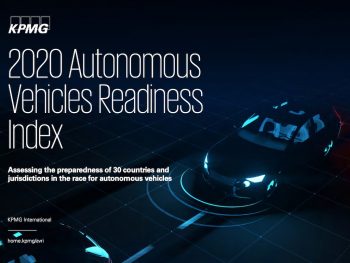UK in danger of slipping behind on autonomous vehicle readiness
The UK risks losing its leadership position on developments in autonomous vehicles if infrastructure issues aren’t tackled, according to KPMG.

KPMG warns the UK is in danger of falling further behind with physical and digital infrastructure developments as other countries advance
Its latest Autonomous Vehicle Readiness Index (AVRI) ranks the UK in ninth position – down two places on last year – as it warns the country is in danger of falling further behind with physical and digital infrastructure developments as other countries advance.
Compared to last year’s ranking, the UK has slipped two places, with South Korea and the United Arab Emirates inching ahead due to planned infrastructure investments. For the third year running Singapore and the Netherlands lead the rankings, but the UK still stands ahead of Germany, Japan and new entrant Denmark, among others.
Key strengths in the UK include an innovative regulatory environment, funding for cybersecurity initiatives, and test beds. This is recognised by its top slot ranking for cybersecurity, while within the technology and innovation pillar, it now sits in ninth position overall, up two places.
There are a number of projects underway across the country to develop cyber security solutions for connected and autonomous vehicles; earlier this year, Zenzic awarded £1.2m in funding from a competition focused on cyber security in self-driving vehicles, with the winners helping to define requirements for and support the development of cyber security testing facilities.
Sarah Owen-Vandersluis, partner and head of future mobility at KPMG UK, said: “Despite dropping two places, the UK continues to be a leader in autonomous vehicle legislation and policy, and has made notable progress to ensure that the regulatory environment will enable autonomous vehicle implementation. There’s real recognition for the work the Government has done around policy and legislation, notably through the Future of Transport Regulatory Review, as well as Zenzic’s work in cybersecurity and on test beds.”
However, as tech and innovation for autonomous vehicles advances, the report asks whether enough is being done to make sure the UK can compete on the global stage and says more focus on infrastructure investment is required; particularly as a number of countries have now advanced their game, through early activity in infrastructure generally in South Korea, and advancements in tech infrastructure specifically in the United Arab Emirates.
Owen-Vandersluis explained: “To be truly ready for autonomous vehicles, the UK first needs to be ready for electric vehicles, with adequate provision of EV charging infrastructure, which many local governments are already focused on. This is a critical element as the availability of EV charging infrastructure is an indicator as to how likely the market is to adopt new technologies like autonomous vehicles.
“There are also physical and commercial challenges to consider, whether it be a lack of power supply, lack of grid coverage or the need for a more viable business model, as these have historically prevented certain areas from having the necessary infrastructure. If the current road networks are to be significantly enhanced and managed in an entirely different way than ever before, a fundamental shift needs to take place and planning for that needs to start now.”
Ben Foulser, director of future mobility at KPMG UK, added: “For the UK to remain competitive in an increasingly 5G-ready world, there needs to be not only clear recognition of the need to invest, but action. The question of where that investment comes from remains to be seen, but without it, the UK will fall further behind its competitors.”
To access the full KPMG report, click here.












